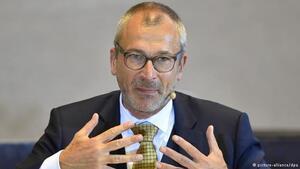German Leaders Speak Out Against Anti-Semitism
Just days before leading German newspapers called for an end to hatred against Jews, our group heard from two German dignitaries who were deeply concerned about the new wave of anti-Semitism infusing protests against Israel’s operations in Gaza. Both MP Volker Beck and Sybilla Bendig of the Foreign Office were clearly shocked by slogans and chants they didn’t think possible in postwar Germany.
Volker Beck was introduced to us as a member of the German Green Party, the spokesperson for religious affairs and head of the German-Israeli parliamentary group in the Bundestag. Later I would learn that he served as spokesman of the Association of Lesbians and Gays in Germany and initiated the move to erect a national memorial in the center of Berlin for homosexuals persecuted by the Nazis. He has also been the sponsor of legislation outlawing discrimination based on race, ethnic origin, sex, sexual identity, religion, age, and disability, and has played a key role in government compensation to victims of Nazism.
He began by expressing his concern over the escalation of anti-Semitism in Germany, occasioned by the current situation in the Middle East. Of particular concern was that it was no longer coming just from the right or the left, but finding support in mainstream German society. He was uncompromising in his insistence that the kinds of posters and placards circulating at recent protest rallies were a criminal offense and that he was pushing hard for police to implement the law. While emphasizing Germany’s commitment to a secure Israel, Volker was also critical of Israeli policies, particularly the continued building of settlements, as well as of the stated goal of the current military action. “Freeing Gaza from Hamas,” he said, “is the task of the Palestinians, not of Israel.”
In an interview with Deutsche Welle, Germany's international broadcaster, that took place a few days after he’d met with us, Volker summarized the major points he spent close to an hour elaborating upon when he addressed our group:
“We need to position ourselves on the side of Israel's right to exist, and also on the side of peace. We want there to be a Palestinian state in the region alongside a secure Israel. And that is the political perspective. It needs to be said that Hamas has contributed to the current escalation, and also that Israel has a responsibility, because it hasn't been very constructive in past peace negotiations and is continuing to build new settlements. There is responsibility, and so there's also ground for criticism.”
Sybilla Bendig of the Foreign Office talked more about the German Jewish community, decimated by the Shoah but slowly reviving over the last two decades with the influx of immigrants from the Soviet Union. As she explained how the government supports the German Jewish community, she underscored the government’s commitment to securing the rights of minorities—“most of all Jews”—noting that unlike other minority groups, Jews, who have been living in Germany for centuries, are not an immigrant group.
Reiterating the Foreign Office’s commitment to fighting anti-Semitism, Bendig refused to even voice the slogans that were being shouted at recent demonstrations, which she believes are criminal offenses. When asked about freedom of speech, she said that Germany today has strict laws on hate speech and Holocaust denial and that these incitements to violence are not, and should not, be covered by laws governing free speech. Like MP Volk, she talked about the importance of distinguishing between criticism of Israel’s actions in the region and calls for the destruction of Israel.
In response to a question from one of the rabbis in the group about how she came to do the work she does, Bendig shared her personal journey with us: “I’m not Jewish but I’m German. At age 12 I learned about the Holocaust. My ancestors were not perpetrators, but I feel responsibility. Not guilt, but responsibility.”
Not guilt, but responsibility—a powerful distinction that not only helped me understand what motivates Sybilla Bendig, but forced me to think more intentionally about what I, the child of a mother who survived Auschwitz and a father who was liberated from Mathausen, was looking for, wanted, and expected from today’s Germany and Germans.




